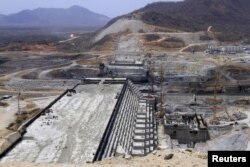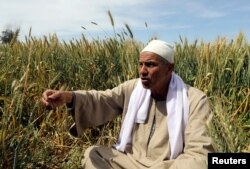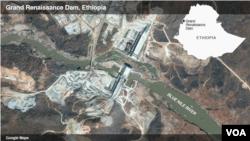Rice farmers in Kafr Ziada village in the Nile River Delta have ignored planting restrictions aimed at conserving water for years, continuing to grow a medium-grain variety of the crop that is prized around the Arab world.
A decision thousands of kilometers to the south is about to change that, however, in another example of how concern about water, one of the world's most valuable commodities, is forcing change in farming, laws and even international diplomacy.
Far upstream, close to one of the sources of the Nile, Ethiopia is preparing to fill the reservoir behind its new $4 billion Grand Renaissance Dam, possibly as soon as this year.
How fast it does so could have devastating consequences for farmers who have depended on the Nile for millennia to irrigate strategic crops for Egypt's 96 million people, expected to grow to 128 million by 2030.
Safeguarding Egypt's share of the Nile, on which the country relies for industry and drinking water as well as farming, is now at the top of President Abdel Fattah el-Sissi's agenda as he begins a second term.
At the same time, authorities are finally tackling widespread illegal growing of the water-intensive rice crop, showing a sense of urgency that even climate change and rapid population growth has failed to foster.
The crackdown means Egypt will likely be a rice importer in 2019 after decades of being a major exporter, rice traders say.
Cairo has decreed that 724,000 feddans (750,000 acres) of rice can be planted this year, which grain traders estimate is less than half of the 1.8 million feddans actually cultivated in 2017 — far in excess of the officially allotted 1.1 million feddans.
Police have started raiding farmers' homes and jailing them until they pay outstanding fines from years back.
"The police came to my house at three in the morning and took me to the station to pay the fine," said Mohamed Abdelkhaleq, head of the farming association in Kafr Ziada, some 125 km (80 miles) north of Cairo in Beheira governorate.
"Even if the fine is 1 Egyptian pound (5 U.S. cents), they'll come to your house."
Three other farmers reported similar experiences and said this year they would not plant rice.
Reda Abdelaziz, 50, said some people have become afraid to leave the village.
"If you're traveling and they take your ID card and see you have a fine on you, they'll put you in jail," he said.
Abdelkhaleq took to the local mosque's loudspeaker last month to say the government was doubling the fine for unauthorized rice cultivation to 7,600 pounds per feddan.
Mostafa al-Naggari, who heads the rice committee of Egypt's agricultural export council, says if the government sticks to the new approach Egypt will likely have to import as much as 1 million tons of rice next year.
"The dam has opened the door for there to be more of an awareness of water scarcity issues, but Egypt has for a long time needed to review its water allocation policy," he said.
No Agreement
Egypt has long considered the Nile its own, even though the river and its tributaries flow through 10 countries. Egyptian President Anwar Sadat famously said in 1979 that he was prepared to go to war over the Nile if its flow was ever threatened.
But any threat from Ethiopia in the past was empty — until now. The new dam, cutting through the Blue Nile tributary just before its descent into southeastern Sudan, will offer Addis Ababa immense political leverage over its downstream neighbors.
Sudan and Egypt are the biggest users of the river for irrigation and dams. Egypt wants to be assured that the dam will not affect the river's flow, estimated at about 84 billion cubic meters on average per year.
Ethiopia aims to use the dam to become Africa's biggest power generator and exporter, linking tens of millions to electricity for the first time.
The two countries have not been able to agree on a comprehensive water-sharing arrangement despite years of negotiations.
Ethiopia was not party to and does not recognize a 1959 agreement between Egypt and Sudan that gave Cairo the rights to the lion's share of the river. For its part, Egypt refuses to sign on to a 2010 regional water-sharing initiative that takes away its power to veto projects that would alter allocations.
Ethiopia says that its dam won't affect the Nile's flow once its 79-billion-cubic-meter reservoir is filled. The issue is over how fast that happens. Ethiopia wants to do it in as little as three years; Egypt is aiming for seven to 10, sources close to the matter said.
There's no doubt the flow of the Nile will be affected during those years. What's not known is how dramatically, and there is little data available to answer that question.
Sources at Egypt's irrigation ministry have estimated the loss of 1 billion cubic meters of water would affect 1 million people and lead to the loss of 200,000 acres of farmland.
On that basis, "if (the dam is) filled in 3 years it might destroy 51 percent of Egypt's farmland, if in 6 years it will destroy 17 percent," said Ashraf el Attal, CEO of Dubai-based commodities trader Fortuna and an expert on Egypt's grain trade.
Be Ready to Adapt
The U.N.'s Food and Agriculture Organization has said Egypt requires an "urgent and massive" response to maintain food security in coming years for a number of reasons, including water scarcity, urbanization and the effects of climate change.
Talks among Egypt, Sudan and Ethiopia on the dam in early April stalled over what Sudan's foreign minister called "technical issues". No date has been set for the next round.
"The filling of the GERD is just the most critical issue for the three countries to decide upon, and now, ahead of the first filling," said Ana Cascão, an independent researcher on Nile hydropolitics.
"A fair and equitable filling strategy must take into account different scenarios on climate and rainfall variability — if it will be one of drought, then the three countries are ready to agree on a slower filling," said Cascão.
Rice farmers, who typically begin planting at the end of April, said they may now leave their lands fallow given the difficulty of quickly switching to other summer crops like cotton and corn that require different machinery and techniques.
Irrigation Minister Mohamed Abdel Aty told Reuters the situation posed a big threat to crops, livelihoods and even political stability if efforts to coordinate fail.
"Imagine to what extent these people will become vulnerable," he said.
($1 = 17.6400 Egyptian pounds)








